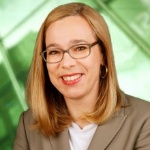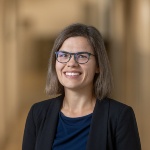In the new Research Focus “Re/producing realities” (Re²), scientists from the humanities, the engineering sciences, simulation science, and visual science at the University of Stuttgart are investigating how media reproduce the real world and create their own realities, and how people deal with these simulations. In the process, the theater and its techniques are providing a model of how virtual, fictional, and digital worlds can be shaped. The goal is, among other things, to improve digital education and increase collaboration between disciplines.
The cultural and historical roots of digital media
“The production and reproduction of realities has long occupied art and science. With the change in media culture and the digitalization of society, these issues are more pressing today than ever before,” says Professor Kirsten Dickhaut, Acting Director of the Institute of Literary Studies (ILW) at the University of Stuttgart. In the Stuttgart Research Focus (SRF) Re2, scientists analyze theatrical techniques, such as staging or choreography, and their influence on the shaping of realities in contemporary media. Interdisciplinary project teams explore the cultural-historical roots of interaction and communication in digital spaces: they investigate the conditions faced and the patterns used by media to simulate and shape realities. They also explore the question of how users receive the worlds created there.
Theater at the center of interdisciplinary research
The research focus of Re² is the theater with all its elements. “Theater is technical and staged per se,” says Professor Michael Resch, Director of the High Performance Computing Center Stuttgart (HLRS). “We can transfer the staging techniques of digitalization to the theater world. At the same time, all digital and technical systems are staged.” Digitalization is making its way into the theater with holograms or 3D animations, while digital media are using theatrical techniques and practices not only for creating virtual spaces, but also for communication. “People were already putting their thumbs up or down in Greek and Roman theaters,” Dickhaut relates. “Whether Facebook, Twitter, or Instagram: this gesture is still a way of community building today.” Theatrical techniques and conventions are used in video conferencing, virtual reality presentations, the development of computer games and autonomous vehicles as well as in the interaction between humans and robots in production processes. “When developing staged worlds, aspects of interaction and the question of how people react to our simulations become more important than technical challenges,” says Resch.
Making historical theater visible using digitalization
By using digital technologies, the researchers want to make theatrical worlds of the past visible. This includes 3D scans of historical theaters, the reproduction of historical theater machines using digital twins, the visualization of various theatrical techniques, and the analysis of their representation in dramatic texts and other literary genres. In addition, new transfer formats are to be established within the framework of Re² in order to present the research results to the public. For example, the planned digital exhibition “Machine Theater”, which will be opened with a vernissage later this year, is intended to provide a behind-the-scenes look at the French theater world of the 17th century. Animations and drawings will illustrate the effects that theater engineers were already able to bring to the stage at the court of the “Sun King” Louis XIV.
A critical examination of the digital world
Starting from the theatrical techniques, the project partners want to develop a new theory of fiction in order to analyze the production and reproduction of realities. Re² is to be further developed into an interdisciplinary research center that puts the “Stuttgarter Weg (Stuttgart Way)” of consistent cooperation between disciplines into practice and fosters an academic culture that relies on diversity, equality, and inclusion. Furthermore, a central goal is to improve digital education and make young people, in particular, aware of the background, the origins, and the limits of virtual worlds. “We want to enable them to critically question reality and fiction in the digital world,” Dickhaut and Resch emphasize. The aim is that everyone involved in media, social, and digital education as well as in the theater world will benefit from the research. With regard to dealing with controversial topics such as Artificial Intelligence, the research is also aimed at decision-makers in politics and business.
The Stuttgart Research Focus (SRF) Re/Producing Realities (Re2) is funded by the Stuttgart Research Council. So far the Institute of Literary Studies (ILW), the research network “Stuttgarter Maschinenbau”, the High Performance Computing Center Stuttgart (HLRS), the Institute for Visualization and Interactive Systems (VIS) at the University of Stuttgart, and the University of Stuttgart Visualization Research Center (VISUS) have been involved in the project. External partners include the German Literature Archive (DLA), the State Academy of Fine Arts (ABK) in Stuttgart, the Knowledge Media Research Center (IWM), the Stuttgart State Theater, and the Young Ensemble Stuttgart (JES).
Information on the Research Focus and its projects can be found on the website of the SRF.
Information on the “Stuttgarter Weg (Stuttgart Way)“ can be found on the website of the University of Stuttgart.
Expert Contact:
Prof. Kirsten Dickhaut, University of Stuttgart, Institute of Literary Studies, phone: +49 711 685 83110, email
Prof. Michael Resch, High Performance Computing Center Stuttgart and Institute of High Performance Computing at the University of Stuttgart, phone: +49 711 685 87200, email

Kirsten Dickhaut
Prof. Dr.Deputy Director ILW / Head of Departments Romance Literatures I (French Studies) and II (Italian Studies)

Michael Resch
Prof. Dr.[Image: Universität Stuttgart]

Lydia Lehmann
Deputy Head of University Communications




